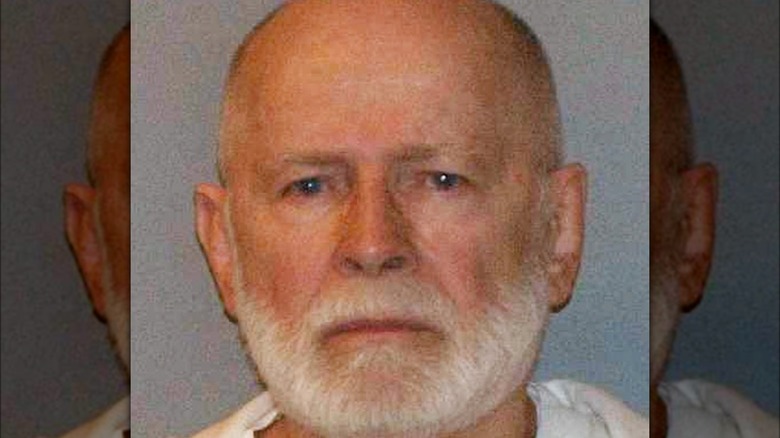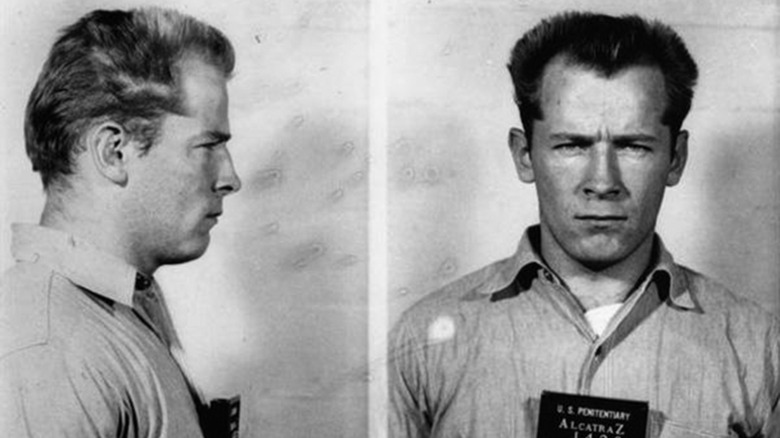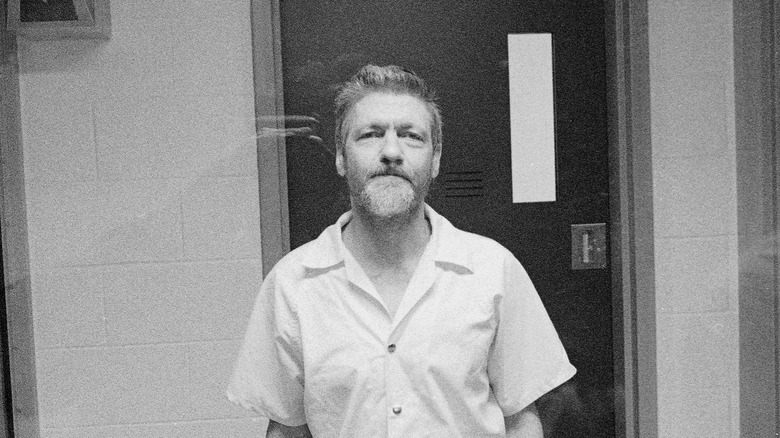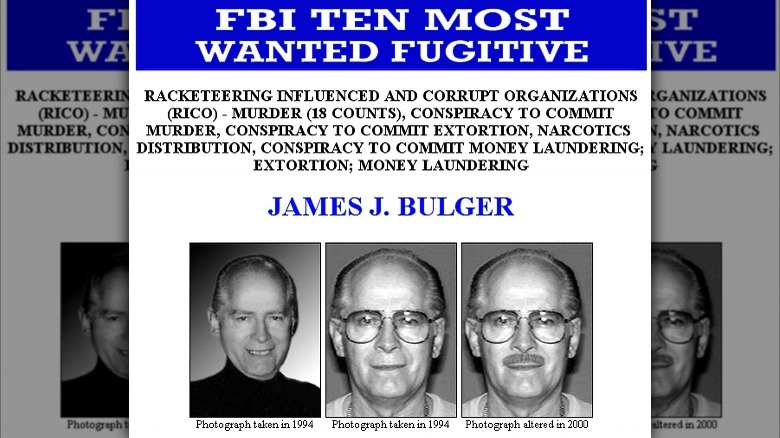Inside The Relationship Of Mob Boss Whitey Bulger And His Brother William
Update: An earlier version of this story indicated Bulger was wanted on racketeering and murder charges in 1995 — at that time, he was only wanted for racketeering charges. The correction has been made to this story.
Whitey Bulger was the mob boss of an organized crime group, the Winter Hill Gang, in Boston from the '70s to the '90s. His story was depicted in the 2015 movie "Black Mass" starring Johnny Depp as Bulger, as he worked with the FBI to help bring down the Italian mob. In 2011, Bulger was arrested on various charges — including murder — after more than a decade of evading authorities (via History). He was sentenced to two counts of life imprisonment, plus five years.
Bulger was born James Joseph Bulger Jr. in 1929 to an Irish-American family in Massachusetts. Whitey, as he was nicknamed because of his light hair, grew up with five other siblings in a housing project in Boston. As reported by ATI, Whitey was a troublemaker even as a young boy and was first arrested at 13 years old. Whitey had a close relationship with his younger brother, William, who was born in 1934. According to WBUR, the two shared a bedroom growing up and shared similar personalities. Despite their similarities, however, they followed different paths. Whitey chose a life of crime while William entered into politics.
Whitey Bulger's background
In his youth, Whitey Bulger was arrested for various charges that started with theft and escalated into other crimes, such as assault, forgery, larceny, and armed robbery. He spent time in a juvenile detention center and upon his release, he enlisted in the Air Force (via Biography). However, his troubles didn't stop there. He was charged with assault during his time in the military and was discharged in 1952. Whitey continued his life of crime and was incarcerated in various prisons, including the notorious Alcatraz Federal Penitentiary.
Whitey was released in 1965, and his stint in prison boosted his reputation among criminals. He became part of an Irish-American gang in his neighborhood and participated in gang wars, which resulted in him committing his first murder, as reported by The Mob Museum. Whitey became the leader of the Winter Hill Gang in 1979 when the former boss was arrested. He continued his crime operations while serving as an FBI informant, but by the end of 1994, authorities were out to arrest him. Whitey left Boston and went on the run until he was finally apprehended in 2011.
William Bulger's background
Unlike his brother, William Bulger chose to live on the straight and narrow. He attended Boston College High School and enrolled in Boston College in 1952 but paused his studies to enlist in the Army. When his service ended in 1955, he returned to college and completed a degree in literature (per Prabook). He pursued further studies and obtained his law degree in 1961.
William was elected to the Massachusetts House of Representatives in 1960 and served five terms. He also served as the senate president of Massachusetts from 1978 until 1996. According to the New England Journal of Public Policy, William became the president of the University of Massachusetts in 1995 but was urged to resign from his position in 2003 in connection with his refusal to cooperate in the search for his fugitive brother, Whitey Bulger. As the brother of a mob boss, many questioned whether William knew of Whitey's illicit activities, and his political career suffered.
The phone call
In 1995, Whitey Bulger was on the lam when he contacted his brother, William, through the phone. According to ABC News, William went to a location to receive the call wherein Whitey said that he was safe. William knew that his brother was wanted by the authorities for racketeering charges, but he never informed authorities of the phone call, and the information wasn't revealed until years later when he testified in front of a grand jury.
The phone call was controversial, and many people questioned why he didn't offer the information to the FBI. Per the Washington Post, William said that it was a private conversation, and his brother never revealed his whereabouts. In addition, he didn't urge his brother to give himself up to the authorities, and he admitted that he didn't feel obligated to help agents locate his brother. During the inquiry, William was asked whether he felt more loyal to Whitey than the people of Massachusetts, to which he replied, "I do have an honest loyalty to my brother, and I care about him . . . It's my hope that I'm never helpful to anyone against him."
Comparisons to the Unabomber case
Some people believed that William Bulger knew more about his brother's activities than he let on, and people can't help but compare his situation with David Kaczynski, the brother of the Unabomber. Ted Kaczynski (pictured above), also known as the Unabomber, killed three people and wounded 23 others in a span of 17 years. He sent bombs to several individuals and was unidentified until a tip from his brother helped catch him. While Kaczynski felt bad for aiding in his brother's arrest, he knew that it was the right thing to do to prevent his brother from killing more innocent people.
William, on the other hand, remained loyal to his brother despite knowing the allegations against him. According to The New York Times, William denied having any type of knowledge that his brother was involved in organized crime and even said that he had never heard of the Winter Hill Gang, which many thought was hard to believe. The brothers of these two criminals both lost something in their choices. Kaczynski lost his relationship with his brother when he helped put him in prison, while William's political career suffered as a result of his loyalty to Whitey.
Whitey Bulger's conviction
William Bulger has always stuck by his brother, and he didn't want to believe the allegations against him. When Whitey Bulger was found guilty of his crimes, William said that he didn't know what to believe. In an interview with News Center 5 in 2013, William shared his thoughts about Whitey's crimes and said that while he did not condone them, he still wanted to be a brother to him; he visited him every week in prison. He also revealed that they never talked about the details of the crimes, and said, "I don't try to sort it out any longer. I just try to be a brother."
In 2018, Whitey was beaten to death by a fellow inmate. He was 89 years old. The documentary movie "My Name is Bulger" was released in 2021, and it tells the story of the two Bulger brothers who took different paths in life. It consists of interviews with William himself, as well as other members of the Bulger family (via The New York Times).





